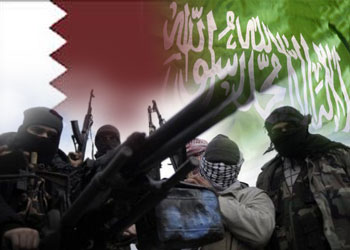Coordinating with CIA, Qatari Diwan, KSA Control Arms Flow to Syria

Local Editor
Reuters reported Wednesday that Qatar, which has taken a lead in arming the Syrian opposition, is coordinating with the CIA.
 Rebel fighters in Syria say that in recent months the system for distributing arms has become more centralized, with arms being delivered through opposition National Coalition's General Command, led by Selim Idriss, a general who defected to the opposition and is a favorite of Washington.
Rebel fighters in Syria say that in recent months the system for distributing arms has become more centralized, with arms being delivered through opposition National Coalition's General Command, led by Selim Idriss, a general who defected to the opposition and is a favorite of Washington.
Qatar mostly sends arms to rebels operating in the north of Syria, while Saudi Arabia, another rich Gulf Arab kingdom, sends weapons to fighters operating in the south, several rebel commanders said.
"The Qataris are now going through the Coalition for aid and humanitarian issues and for military issues they are going through the military command," a commander in northern Syria interviewed from Beirut said.
He further stated: "Before the Coalition was formed they were going through liaison offices and other military and civil formations. That was at the beginning. Now it is different - it is all going through the Coalition and the military command."
Today, Qatari shipments have resumed with controls exerted from the palace of Qatar's emir, Sheikh Hamad bin Khalifa al-Thani, in consultation with the US Central Intelligence Agency, said a senior Qatari security official.
"There's an operations room in the Emir's diwan (office complex), with representatives from every ministry sitting in that room, deciding how much money to allocate for Syria's aid," the Qatari official said.
"There's a lot of consultation with the CIA, and they help Qatar with buying and moving the weapons into Syria, but just as consultants," he said. The CIA declined to comment.
Rebel commanders contacted by Reuters said they submit their lists of needs to the General Command led by Idriss, which forwards the requests to Qatar or Saudi Arabia.
One Western source involved in the process said that sometimes weapons sent in by Qatar do in fact reach hardline groups.
Several rebel commanders said they believed wealthy Kuwaiti and Saudi individuals were also sending weapons and money to rebel fighters outside the National Coalition's distribution channel.
"They usually ask for a video proving that an attack took place with the name of the brigade that did it. Sometimes they ask for a statement expressing gratitude," said a rebel commander in Damascus.
He said the Saudis and Qataris also occasionally send weapons into each other's territory, bypassing normal controls.
"Sometimes the Qataris manage to send stuff to the southern part and the Saudis to the northern side. When they do so, they send it to brigades that are not part of the military command."
According to the Qatari official, weapons supplied included AK-47 rifles, rocket propelled grenades, hand grenades and ammunition. Qatar also provides instructions on battlefield techniques such as how to rig weapons on vehicles.
The weapons are purchased mainly from eastern Europe by arms brokers based in Britain and France, and are flown from Qatar to Ankara and then trucked to Syria, the Qatari source added.
Hugh Griffiths, a researcher on arms transfers at the Stockholm International Peace Research Institute, said 90 Qatari military air cargo flights were made to Turkey between 3 January 2012 and the end of April 2013.
He suggested the Qataris had made no particular effort to disguise the nature of the cargo.
The planes were Qatari air force aircraft flying from Al Udeid, a big air force base shared with the US military.
"This is quite unusual for arms deliveries intended for non-state actors in conflict zones, in the last 20 years or so the pattern has been to use private, commercial companies," he said.
Source: Reuters, Edited by moqawama.org




